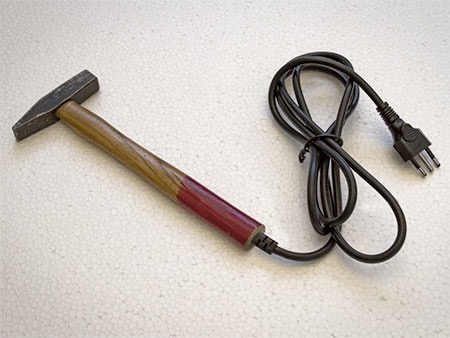Crapmanship

"I'd better find my satisfaction in accepting that I fooled at least those eyes."
Replacing three sun-rotted window frames, I couldn't avoid encountering evidence of Crapmanship in their original fabrication. This sort of discovery doesn't qualify as in any way unusual, for stuff has always featured mixes of Crapmanship and craftsmanship. Exteriors tend to look as though they were painstakingly put together, but beneath any surface, which might have been no more than expertly painted, some real crap work likely lurks. I'm still learning not to become all indignant about this apparently eternal feature of this world. I understand that internal workings might not really require fine-looking construction to serve an intended purpose. We all seem to cut corners that don't seem to matter much. We hack, therefore we are. ©2018 by David A. Schmaltz - all rights reserved
I've of course added my own unique brand of shoddy into my fixes. I'm not the finish carpenter my grandfather was, so I improvise. My improvs should rightly offend anyone actually knowing how to do the job, but since I'm not them, I give myself some slack. Once completed, my indiscretions will: a) be a sight better than what they replaced, and b) last for twenty or more years if they need to. The prior window framing had sun rotted to the point where I removed it using nothing more than my fingers. The replacements will be weather-tight in spite of the fact that they never aspired to be perfect. Perfect would have represented unnecessary effort, I tell myself, catching myself being efficient and pragmatic, though I finish the fix feeling like I imagine a real craftsman feels upon completing his work. I know the shortcuts I took. Nobody else ever need know. Other, earlier Crapmanship should lap my own before mine ever comes under future scrutiny.
Eventually, everything tends to be held together with some form of duct tape. This might be an actual law of nature, extended from a prior tactic employing baling wire, and I have no idea what came before that. I see ancient constructions that seem to have survived the ages without strategically employing duct tape. A several hundred year old clock that still keeps perfect time. A millennia-old cathedral that seems, to my present eye, intact, though I cannot perceive from within my thin slice of time, the ongoing maintenance over time which kept the object apparently intact. When I sneak back behind the tourist track, I find a rubble-filled back wall about as finely crafted as a toddler's sandpile castle.
I believe that the ability to integrate crapmanship with craftsmanship might be the essential skill of any true master. The ability to discern which part of the work really requires fine finishing and which needs no more than crude approximation demonstrates the fabricator's wisdom, a facility enabling the master to properly focus effort. I figure it's no more than vanity to invest more effort than the purpose for which the effort's expended requires. Hobbyists lay twice the concrete the foundation needs. Masters, never any more than required. Hackers like me, sand and scrape, then paint with little true talent, then judge the results from a distance, maybe even squinting to erase the few remaining surface imperfections that I'm likely to be the only one to ever notice, since I alone watched myself creating them. To an untrained eye, which includes almost everyone ever likely to pass by, the finish looks plenty masterful enough. The passersby might even extend a complement, wondering to themselves how I mastered such a skill I never really mastered, certainly not to my own eye. I'd better find my satisfaction in accepting that I fooled at least those eyes.


